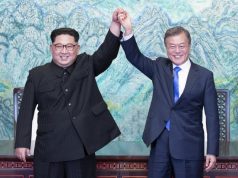

It may come as a surprise how easy it is to visit.
“The North Korean government has strongly boosted its tourism sector,” notes Harry Reingruber of the German Travel Network, which has been offering trips to the country for years.
But visitor beware: It won’t be a luxury trip. You’ll also need to know how to tiptoe around political sensitivities while there. Here’s a question-and-answer about travelling to North Korea:
Who may enter North Korea?
Virtually anyone can go there – except South Koreans. Tourists need a visa, something that is taken care of by a travel operator who acquires the visa from the North Korean embassy on your behalf. “The cooperation with the authorities is actually simpler than that with many other countries,” Reingruber notes.
How is a trip to North Korea operated?
Every trip must be booked as a package tour, and that’s not cheap. Eight days starting from Beijing is going to cost over 2,000 dollars. The tours always start in Beijing, where one of the few direct flight connections to the capital Pyongyang is offered.
All hotels, restaurants and sightseeing destinations have to be selected before the trip. Visitors may express some wishes about what to see, but in the end it is the government that decides. Excursions on one’s own are prohibited.
Is there much to see in North Korea?
“Tourists are allowed to visit about 15 locations,” says Reingruber. Visitors are kept at a distance to make sure they don’t get any impression of the country’s poverty or structural problems. Most of the time is spent in Pyongyang, with excursions offered from there for hiking and skiing in the mountains.
Visits to historical sites are possible. The Goguryeo tombs complex and the historical monuments in Kaesong are UNESCO-listed World Cultural Heritage Sites.
What restrictions might tourists face?
“The hotels are of the upper medium-class category,” Chen says. Even still, tourists can expect electricity and warm water can often be interrupted in North Korea. There are no mobile phone connections, and internet links are rare – and offered under strict conditions.
Tourists can usually make telephone calls from hotels without any problem. Travellers should bring enough cash to cover the expected costs, since there are no ATMs in North Korea.
What should a visitor absolutely refrain from doing?
First, don’t ask critical questions of your tour guide. “Abasing or insulting the political system is a no-go,” Eric Ballbach of the Free University of Berlin’s Institute of Korean Studies says.
The same applies to Western symbols – Western newspapers and Bibles are taboo. How the authorities react to infractions depends above all on the country the visitor is from. In the worst cases, a tourist may be expelled, or even detained as a means of political pressure, Ballbach says.
What health precautions should travellers take?
There is no mandatory vaccination for travellers. But Western officials recommend vaccinations for tetanus, diphtheria, polio and hepatitis A.
“The health system in North Korea is dramatically bad,” Ballbach cautions. Travellers should therefore bring along the medications they need in adequate quantities.
Is a trip to North Korea defensible on ethical grounds?
“Decisive for a trip is one’s individual motives,” Ballbach says. Many people simply want to understand North Korea better. Others share a sense of empathy with the people of the country. Many German visitors are from the former East Germany and so are interested in the country’s communist system.
-dpa









